Developing Employability and Academic Skills: A Reflective Report
VerifiedAdded on 2023/01/09
|8
|2912
|68
Report
AI Summary
This report provides a comprehensive reflection on the development of academic and employability skills. It begins by defining key terms and then delves into the author's personal learning journey, highlighting the importance of reflection for skill enhancement. The main body of the report utilizes Gibbs' reflective cycle, Boud's triangular representation, and Kolb's learning model to analyze the author's experiences and identify areas for improvement in areas such as cover letter writing, speaking, listening, and teaching skills. The analysis includes the application of Lewin’s change management model and Atkins and Murphy model of reflection to evaluate these skills. The report concludes with an action plan, outlining steps for future professional development and the enhancement of employability skills. The author's experience in learning and the use of reflective models like Gibbs, Boud’s triangular representation, and Kolb's model, provides a framework for the development of skills, and strategies for continuous improvement. The report showcases the practical application of theoretical concepts to personal growth.
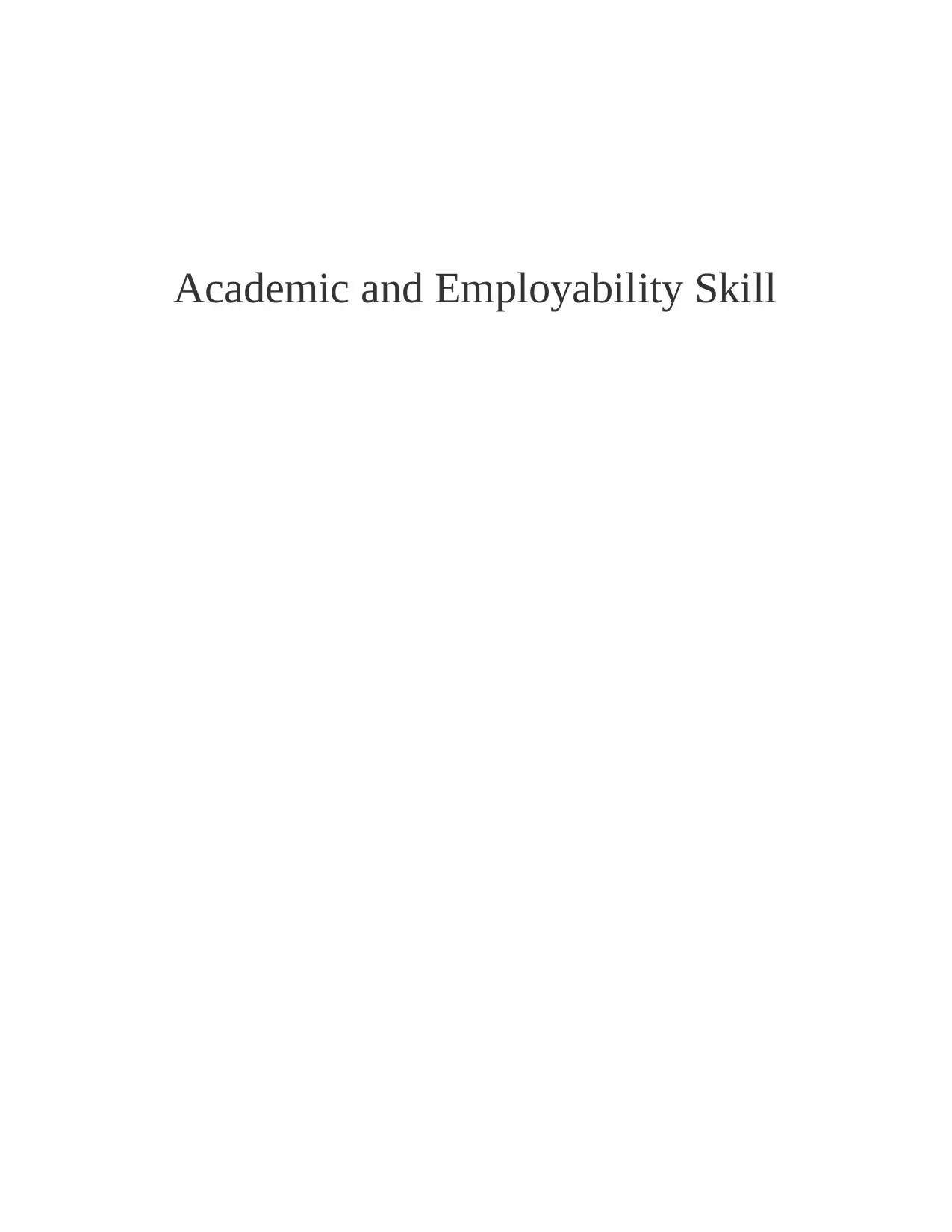
Academic and Employability Skill
Paraphrase This Document
Need a fresh take? Get an instant paraphrase of this document with our AI Paraphraser
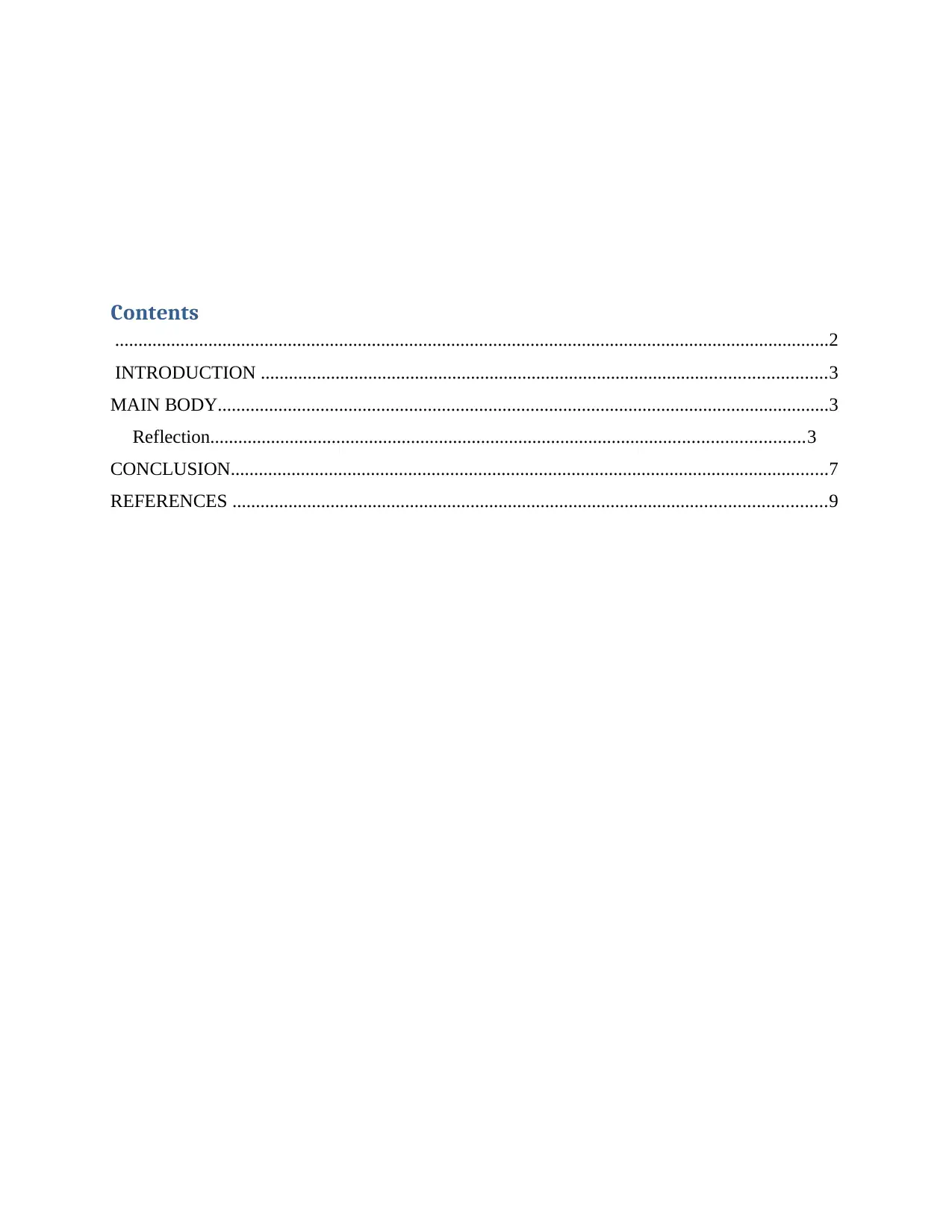
Contents
.........................................................................................................................................................2
INTRODUCTION .........................................................................................................................3
MAIN BODY...................................................................................................................................3
Reflection...............................................................................................................................3
CONCLUSION................................................................................................................................7
REFERENCES ...............................................................................................................................9
.........................................................................................................................................................2
INTRODUCTION .........................................................................................................................3
MAIN BODY...................................................................................................................................3
Reflection...............................................................................................................................3
CONCLUSION................................................................................................................................7
REFERENCES ...............................................................................................................................9
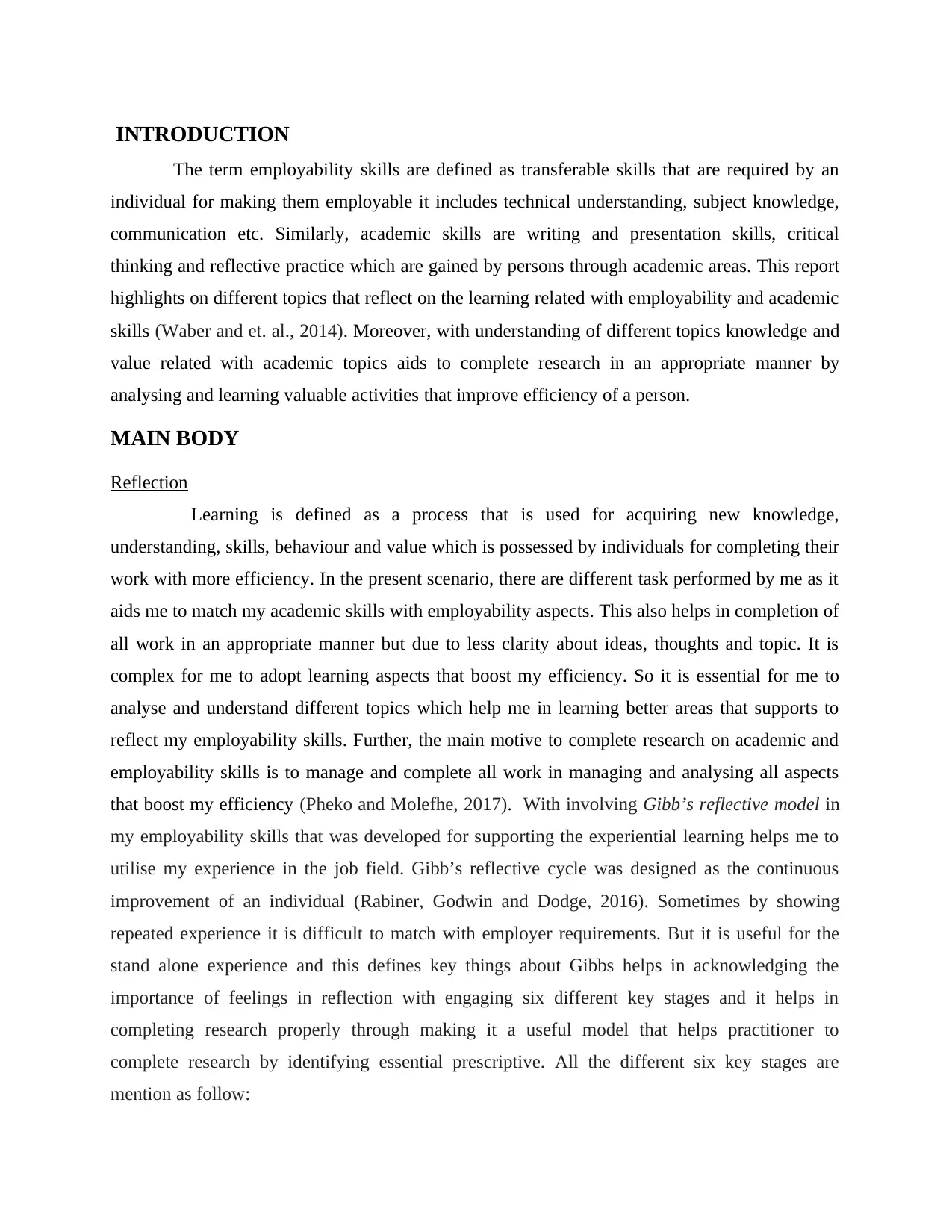
INTRODUCTION
The term employability skills are defined as transferable skills that are required by an
individual for making them employable it includes technical understanding, subject knowledge,
communication etc. Similarly, academic skills are writing and presentation skills, critical
thinking and reflective practice which are gained by persons through academic areas. This report
highlights on different topics that reflect on the learning related with employability and academic
skills (Waber and et. al., 2014). Moreover, with understanding of different topics knowledge and
value related with academic topics aids to complete research in an appropriate manner by
analysing and learning valuable activities that improve efficiency of a person.
MAIN BODY
Reflection
Learning is defined as a process that is used for acquiring new knowledge,
understanding, skills, behaviour and value which is possessed by individuals for completing their
work with more efficiency. In the present scenario, there are different task performed by me as it
aids me to match my academic skills with employability aspects. This also helps in completion of
all work in an appropriate manner but due to less clarity about ideas, thoughts and topic. It is
complex for me to adopt learning aspects that boost my efficiency. So it is essential for me to
analyse and understand different topics which help me in learning better areas that supports to
reflect my employability skills. Further, the main motive to complete research on academic and
employability skills is to manage and complete all work in managing and analysing all aspects
that boost my efficiency (Pheko and Molefhe, 2017). With involving Gibb’s reflective model in
my employability skills that was developed for supporting the experiential learning helps me to
utilise my experience in the job field. Gibb’s reflective cycle was designed as the continuous
improvement of an individual (Rabiner, Godwin and Dodge, 2016). Sometimes by showing
repeated experience it is difficult to match with employer requirements. But it is useful for the
stand alone experience and this defines key things about Gibbs helps in acknowledging the
importance of feelings in reflection with engaging six different key stages and it helps in
completing research properly through making it a useful model that helps practitioner to
complete research by identifying essential prescriptive. All the different six key stages are
mention as follow:
The term employability skills are defined as transferable skills that are required by an
individual for making them employable it includes technical understanding, subject knowledge,
communication etc. Similarly, academic skills are writing and presentation skills, critical
thinking and reflective practice which are gained by persons through academic areas. This report
highlights on different topics that reflect on the learning related with employability and academic
skills (Waber and et. al., 2014). Moreover, with understanding of different topics knowledge and
value related with academic topics aids to complete research in an appropriate manner by
analysing and learning valuable activities that improve efficiency of a person.
MAIN BODY
Reflection
Learning is defined as a process that is used for acquiring new knowledge,
understanding, skills, behaviour and value which is possessed by individuals for completing their
work with more efficiency. In the present scenario, there are different task performed by me as it
aids me to match my academic skills with employability aspects. This also helps in completion of
all work in an appropriate manner but due to less clarity about ideas, thoughts and topic. It is
complex for me to adopt learning aspects that boost my efficiency. So it is essential for me to
analyse and understand different topics which help me in learning better areas that supports to
reflect my employability skills. Further, the main motive to complete research on academic and
employability skills is to manage and complete all work in managing and analysing all aspects
that boost my efficiency (Pheko and Molefhe, 2017). With involving Gibb’s reflective model in
my employability skills that was developed for supporting the experiential learning helps me to
utilise my experience in the job field. Gibb’s reflective cycle was designed as the continuous
improvement of an individual (Rabiner, Godwin and Dodge, 2016). Sometimes by showing
repeated experience it is difficult to match with employer requirements. But it is useful for the
stand alone experience and this defines key things about Gibbs helps in acknowledging the
importance of feelings in reflection with engaging six different key stages and it helps in
completing research properly through making it a useful model that helps practitioner to
complete research by identifying essential prescriptive. All the different six key stages are
mention as follow:
⊘ This is a preview!⊘
Do you want full access?
Subscribe today to unlock all pages.

Trusted by 1+ million students worldwide
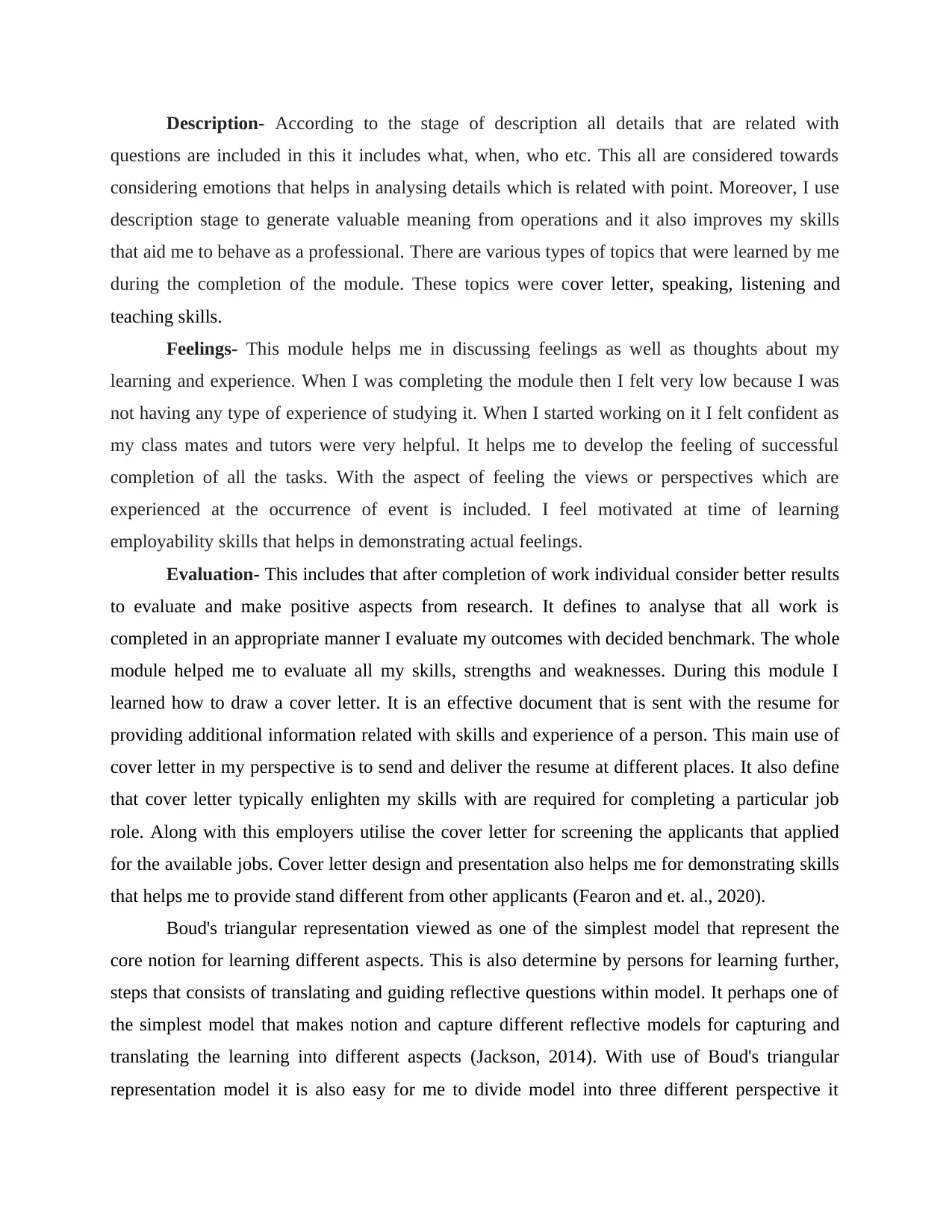
Description- According to the stage of description all details that are related with
questions are included in this it includes what, when, who etc. This all are considered towards
considering emotions that helps in analysing details which is related with point. Moreover, I use
description stage to generate valuable meaning from operations and it also improves my skills
that aid me to behave as a professional. There are various types of topics that were learned by me
during the completion of the module. These topics were cover letter, speaking, listening and
teaching skills.
Feelings- This module helps me in discussing feelings as well as thoughts about my
learning and experience. When I was completing the module then I felt very low because I was
not having any type of experience of studying it. When I started working on it I felt confident as
my class mates and tutors were very helpful. It helps me to develop the feeling of successful
completion of all the tasks. With the aspect of feeling the views or perspectives which are
experienced at the occurrence of event is included. I feel motivated at time of learning
employability skills that helps in demonstrating actual feelings.
Evaluation- This includes that after completion of work individual consider better results
to evaluate and make positive aspects from research. It defines to analyse that all work is
completed in an appropriate manner I evaluate my outcomes with decided benchmark. The whole
module helped me to evaluate all my skills, strengths and weaknesses. During this module I
learned how to draw a cover letter. It is an effective document that is sent with the resume for
providing additional information related with skills and experience of a person. This main use of
cover letter in my perspective is to send and deliver the resume at different places. It also define
that cover letter typically enlighten my skills with are required for completing a particular job
role. Along with this employers utilise the cover letter for screening the applicants that applied
for the available jobs. Cover letter design and presentation also helps me for demonstrating skills
that helps me to provide stand different from other applicants (Fearon and et. al., 2020).
Boud's triangular representation viewed as one of the simplest model that represent the
core notion for learning different aspects. This is also determine by persons for learning further,
steps that consists of translating and guiding reflective questions within model. It perhaps one of
the simplest model that makes notion and capture different reflective models for capturing and
translating the learning into different aspects (Jackson, 2014). With use of Boud's triangular
representation model it is also easy for me to divide model into three different perspective it
questions are included in this it includes what, when, who etc. This all are considered towards
considering emotions that helps in analysing details which is related with point. Moreover, I use
description stage to generate valuable meaning from operations and it also improves my skills
that aid me to behave as a professional. There are various types of topics that were learned by me
during the completion of the module. These topics were cover letter, speaking, listening and
teaching skills.
Feelings- This module helps me in discussing feelings as well as thoughts about my
learning and experience. When I was completing the module then I felt very low because I was
not having any type of experience of studying it. When I started working on it I felt confident as
my class mates and tutors were very helpful. It helps me to develop the feeling of successful
completion of all the tasks. With the aspect of feeling the views or perspectives which are
experienced at the occurrence of event is included. I feel motivated at time of learning
employability skills that helps in demonstrating actual feelings.
Evaluation- This includes that after completion of work individual consider better results
to evaluate and make positive aspects from research. It defines to analyse that all work is
completed in an appropriate manner I evaluate my outcomes with decided benchmark. The whole
module helped me to evaluate all my skills, strengths and weaknesses. During this module I
learned how to draw a cover letter. It is an effective document that is sent with the resume for
providing additional information related with skills and experience of a person. This main use of
cover letter in my perspective is to send and deliver the resume at different places. It also define
that cover letter typically enlighten my skills with are required for completing a particular job
role. Along with this employers utilise the cover letter for screening the applicants that applied
for the available jobs. Cover letter design and presentation also helps me for demonstrating skills
that helps me to provide stand different from other applicants (Fearon and et. al., 2020).
Boud's triangular representation viewed as one of the simplest model that represent the
core notion for learning different aspects. This is also determine by persons for learning further,
steps that consists of translating and guiding reflective questions within model. It perhaps one of
the simplest model that makes notion and capture different reflective models for capturing and
translating the learning into different aspects (Jackson, 2014). With use of Boud's triangular
representation model it is also easy for me to divide model into three different perspective it
Paraphrase This Document
Need a fresh take? Get an instant paraphrase of this document with our AI Paraphraser
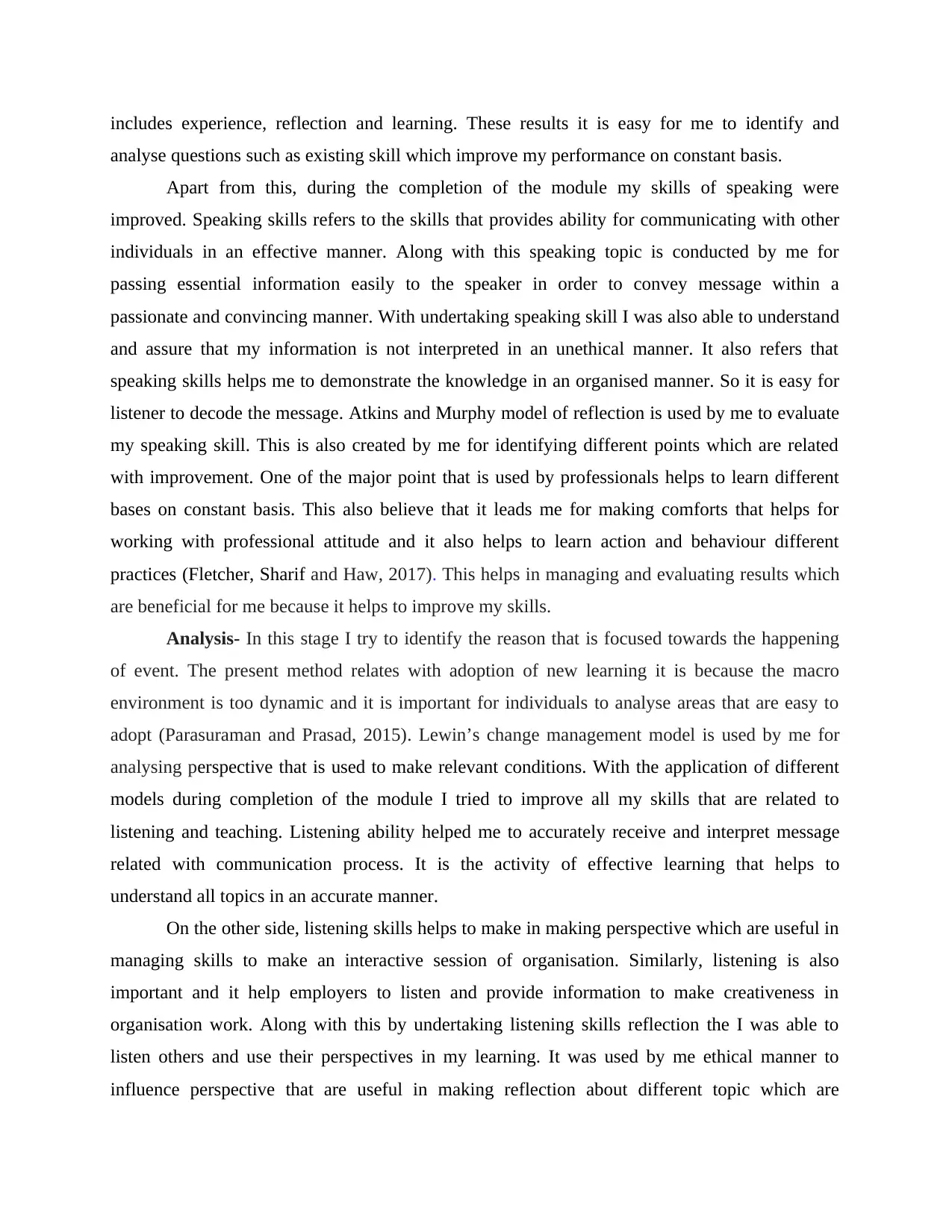
includes experience, reflection and learning. These results it is easy for me to identify and
analyse questions such as existing skill which improve my performance on constant basis.
Apart from this, during the completion of the module my skills of speaking were
improved. Speaking skills refers to the skills that provides ability for communicating with other
individuals in an effective manner. Along with this speaking topic is conducted by me for
passing essential information easily to the speaker in order to convey message within a
passionate and convincing manner. With undertaking speaking skill I was also able to understand
and assure that my information is not interpreted in an unethical manner. It also refers that
speaking skills helps me to demonstrate the knowledge in an organised manner. So it is easy for
listener to decode the message. Atkins and Murphy model of reflection is used by me to evaluate
my speaking skill. This is also created by me for identifying different points which are related
with improvement. One of the major point that is used by professionals helps to learn different
bases on constant basis. This also believe that it leads me for making comforts that helps for
working with professional attitude and it also helps to learn action and behaviour different
practices (Fletcher, Sharif and Haw, 2017). This helps in managing and evaluating results which
are beneficial for me because it helps to improve my skills.
Analysis- In this stage I try to identify the reason that is focused towards the happening
of event. The present method relates with adoption of new learning it is because the macro
environment is too dynamic and it is important for individuals to analyse areas that are easy to
adopt (Parasuraman and Prasad, 2015). Lewin’s change management model is used by me for
analysing perspective that is used to make relevant conditions. With the application of different
models during completion of the module I tried to improve all my skills that are related to
listening and teaching. Listening ability helped me to accurately receive and interpret message
related with communication process. It is the activity of effective learning that helps to
understand all topics in an accurate manner.
On the other side, listening skills helps to make in making perspective which are useful in
managing skills to make an interactive session of organisation. Similarly, listening is also
important and it help employers to listen and provide information to make creativeness in
organisation work. Along with this by undertaking listening skills reflection the I was able to
listen others and use their perspectives in my learning. It was used by me ethical manner to
influence perspective that are useful in making reflection about different topic which are
analyse questions such as existing skill which improve my performance on constant basis.
Apart from this, during the completion of the module my skills of speaking were
improved. Speaking skills refers to the skills that provides ability for communicating with other
individuals in an effective manner. Along with this speaking topic is conducted by me for
passing essential information easily to the speaker in order to convey message within a
passionate and convincing manner. With undertaking speaking skill I was also able to understand
and assure that my information is not interpreted in an unethical manner. It also refers that
speaking skills helps me to demonstrate the knowledge in an organised manner. So it is easy for
listener to decode the message. Atkins and Murphy model of reflection is used by me to evaluate
my speaking skill. This is also created by me for identifying different points which are related
with improvement. One of the major point that is used by professionals helps to learn different
bases on constant basis. This also believe that it leads me for making comforts that helps for
working with professional attitude and it also helps to learn action and behaviour different
practices (Fletcher, Sharif and Haw, 2017). This helps in managing and evaluating results which
are beneficial for me because it helps to improve my skills.
Analysis- In this stage I try to identify the reason that is focused towards the happening
of event. The present method relates with adoption of new learning it is because the macro
environment is too dynamic and it is important for individuals to analyse areas that are easy to
adopt (Parasuraman and Prasad, 2015). Lewin’s change management model is used by me for
analysing perspective that is used to make relevant conditions. With the application of different
models during completion of the module I tried to improve all my skills that are related to
listening and teaching. Listening ability helped me to accurately receive and interpret message
related with communication process. It is the activity of effective learning that helps to
understand all topics in an accurate manner.
On the other side, listening skills helps to make in making perspective which are useful in
managing skills to make an interactive session of organisation. Similarly, listening is also
important and it help employers to listen and provide information to make creativeness in
organisation work. Along with this by undertaking listening skills reflection the I was able to
listen others and use their perspectives in my learning. It was used by me ethical manner to
influence perspective that are useful in making reflection about different topic which are
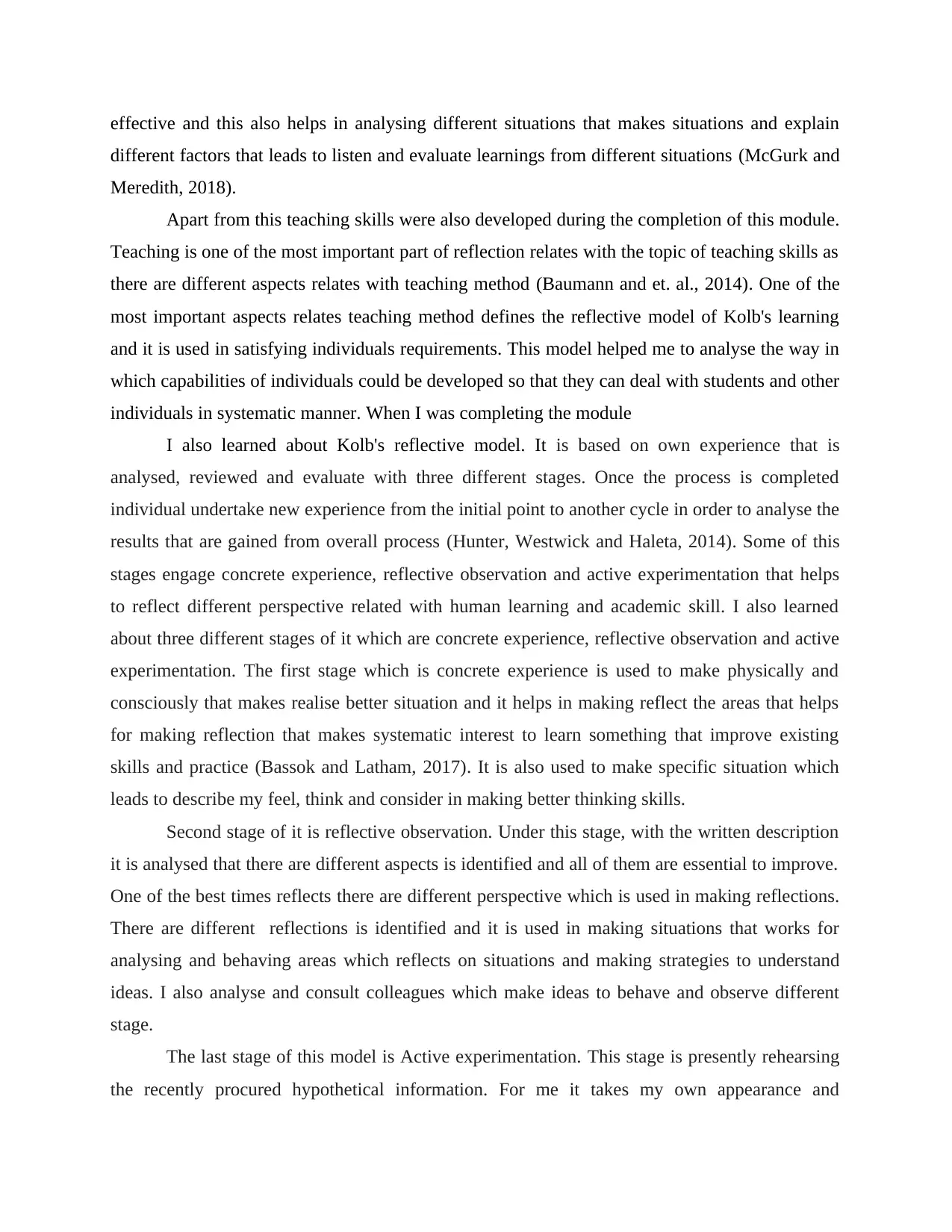
effective and this also helps in analysing different situations that makes situations and explain
different factors that leads to listen and evaluate learnings from different situations (McGurk and
Meredith, 2018).
Apart from this teaching skills were also developed during the completion of this module.
Teaching is one of the most important part of reflection relates with the topic of teaching skills as
there are different aspects relates with teaching method (Baumann and et. al., 2014). One of the
most important aspects relates teaching method defines the reflective model of Kolb's learning
and it is used in satisfying individuals requirements. This model helped me to analyse the way in
which capabilities of individuals could be developed so that they can deal with students and other
individuals in systematic manner. When I was completing the module
I also learned about Kolb's reflective model. It is based on own experience that is
analysed, reviewed and evaluate with three different stages. Once the process is completed
individual undertake new experience from the initial point to another cycle in order to analyse the
results that are gained from overall process (Hunter, Westwick and Haleta, 2014). Some of this
stages engage concrete experience, reflective observation and active experimentation that helps
to reflect different perspective related with human learning and academic skill. I also learned
about three different stages of it which are concrete experience, reflective observation and active
experimentation. The first stage which is concrete experience is used to make physically and
consciously that makes realise better situation and it helps in making reflect the areas that helps
for making reflection that makes systematic interest to learn something that improve existing
skills and practice (Bassok and Latham, 2017). It is also used to make specific situation which
leads to describe my feel, think and consider in making better thinking skills.
Second stage of it is reflective observation. Under this stage, with the written description
it is analysed that there are different aspects is identified and all of them are essential to improve.
One of the best times reflects there are different perspective which is used in making reflections.
There are different reflections is identified and it is used in making situations that works for
analysing and behaving areas which reflects on situations and making strategies to understand
ideas. I also analyse and consult colleagues which make ideas to behave and observe different
stage.
The last stage of this model is Active experimentation. This stage is presently rehearsing
the recently procured hypothetical information. For me it takes my own appearance and
different factors that leads to listen and evaluate learnings from different situations (McGurk and
Meredith, 2018).
Apart from this teaching skills were also developed during the completion of this module.
Teaching is one of the most important part of reflection relates with the topic of teaching skills as
there are different aspects relates with teaching method (Baumann and et. al., 2014). One of the
most important aspects relates teaching method defines the reflective model of Kolb's learning
and it is used in satisfying individuals requirements. This model helped me to analyse the way in
which capabilities of individuals could be developed so that they can deal with students and other
individuals in systematic manner. When I was completing the module
I also learned about Kolb's reflective model. It is based on own experience that is
analysed, reviewed and evaluate with three different stages. Once the process is completed
individual undertake new experience from the initial point to another cycle in order to analyse the
results that are gained from overall process (Hunter, Westwick and Haleta, 2014). Some of this
stages engage concrete experience, reflective observation and active experimentation that helps
to reflect different perspective related with human learning and academic skill. I also learned
about three different stages of it which are concrete experience, reflective observation and active
experimentation. The first stage which is concrete experience is used to make physically and
consciously that makes realise better situation and it helps in making reflect the areas that helps
for making reflection that makes systematic interest to learn something that improve existing
skills and practice (Bassok and Latham, 2017). It is also used to make specific situation which
leads to describe my feel, think and consider in making better thinking skills.
Second stage of it is reflective observation. Under this stage, with the written description
it is analysed that there are different aspects is identified and all of them are essential to improve.
One of the best times reflects there are different perspective which is used in making reflections.
There are different reflections is identified and it is used in making situations that works for
analysing and behaving areas which reflects on situations and making strategies to understand
ideas. I also analyse and consult colleagues which make ideas to behave and observe different
stage.
The last stage of this model is Active experimentation. This stage is presently rehearsing
the recently procured hypothetical information. For me it takes my own appearance and
⊘ This is a preview!⊘
Do you want full access?
Subscribe today to unlock all pages.

Trusted by 1+ million students worldwide
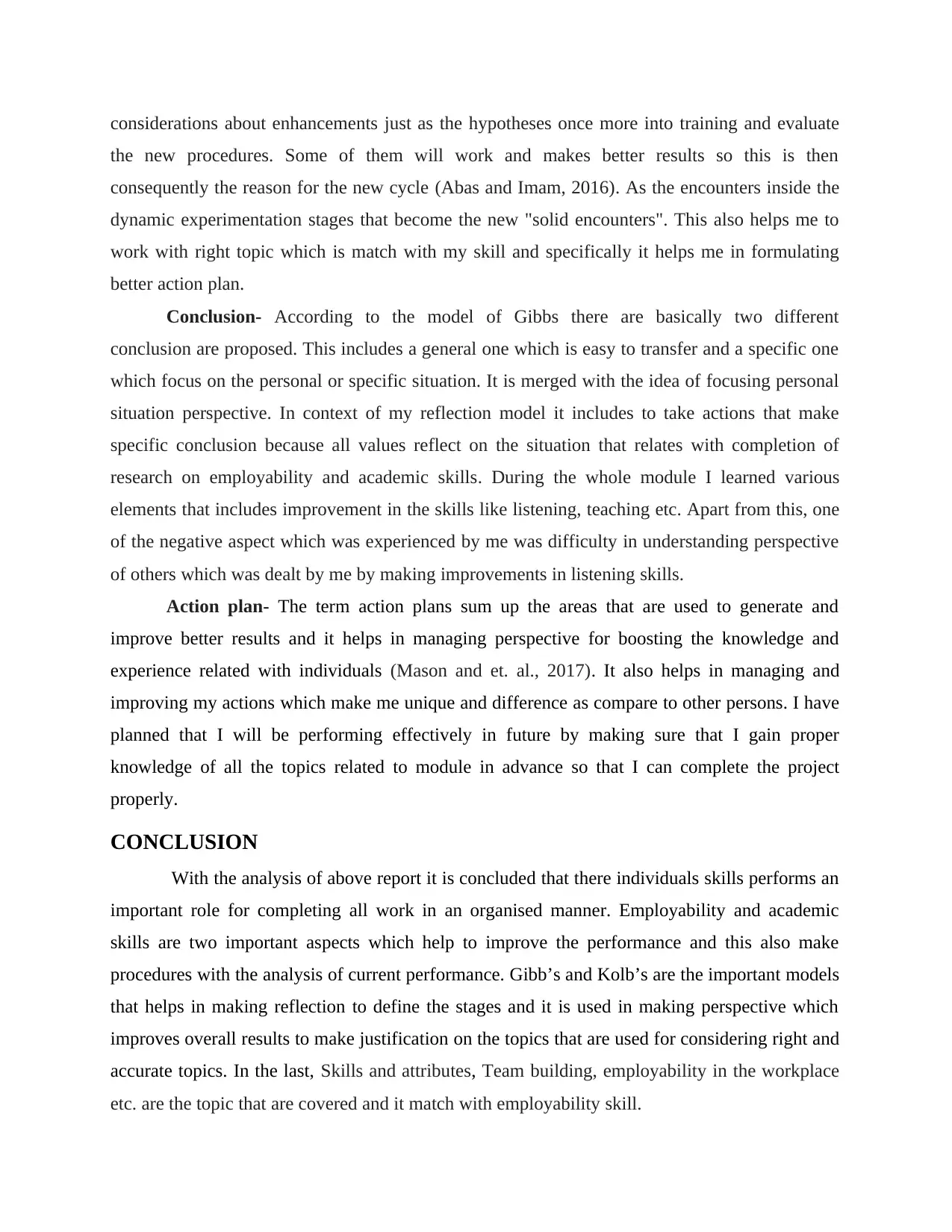
considerations about enhancements just as the hypotheses once more into training and evaluate
the new procedures. Some of them will work and makes better results so this is then
consequently the reason for the new cycle (Abas and Imam, 2016). As the encounters inside the
dynamic experimentation stages that become the new "solid encounters". This also helps me to
work with right topic which is match with my skill and specifically it helps me in formulating
better action plan.
Conclusion- According to the model of Gibbs there are basically two different
conclusion are proposed. This includes a general one which is easy to transfer and a specific one
which focus on the personal or specific situation. It is merged with the idea of focusing personal
situation perspective. In context of my reflection model it includes to take actions that make
specific conclusion because all values reflect on the situation that relates with completion of
research on employability and academic skills. During the whole module I learned various
elements that includes improvement in the skills like listening, teaching etc. Apart from this, one
of the negative aspect which was experienced by me was difficulty in understanding perspective
of others which was dealt by me by making improvements in listening skills.
Action plan- The term action plans sum up the areas that are used to generate and
improve better results and it helps in managing perspective for boosting the knowledge and
experience related with individuals (Mason and et. al., 2017). It also helps in managing and
improving my actions which make me unique and difference as compare to other persons. I have
planned that I will be performing effectively in future by making sure that I gain proper
knowledge of all the topics related to module in advance so that I can complete the project
properly.
CONCLUSION
With the analysis of above report it is concluded that there individuals skills performs an
important role for completing all work in an organised manner. Employability and academic
skills are two important aspects which help to improve the performance and this also make
procedures with the analysis of current performance. Gibb’s and Kolb’s are the important models
that helps in making reflection to define the stages and it is used in making perspective which
improves overall results to make justification on the topics that are used for considering right and
accurate topics. In the last, Skills and attributes, Team building, employability in the workplace
etc. are the topic that are covered and it match with employability skill.
the new procedures. Some of them will work and makes better results so this is then
consequently the reason for the new cycle (Abas and Imam, 2016). As the encounters inside the
dynamic experimentation stages that become the new "solid encounters". This also helps me to
work with right topic which is match with my skill and specifically it helps me in formulating
better action plan.
Conclusion- According to the model of Gibbs there are basically two different
conclusion are proposed. This includes a general one which is easy to transfer and a specific one
which focus on the personal or specific situation. It is merged with the idea of focusing personal
situation perspective. In context of my reflection model it includes to take actions that make
specific conclusion because all values reflect on the situation that relates with completion of
research on employability and academic skills. During the whole module I learned various
elements that includes improvement in the skills like listening, teaching etc. Apart from this, one
of the negative aspect which was experienced by me was difficulty in understanding perspective
of others which was dealt by me by making improvements in listening skills.
Action plan- The term action plans sum up the areas that are used to generate and
improve better results and it helps in managing perspective for boosting the knowledge and
experience related with individuals (Mason and et. al., 2017). It also helps in managing and
improving my actions which make me unique and difference as compare to other persons. I have
planned that I will be performing effectively in future by making sure that I gain proper
knowledge of all the topics related to module in advance so that I can complete the project
properly.
CONCLUSION
With the analysis of above report it is concluded that there individuals skills performs an
important role for completing all work in an organised manner. Employability and academic
skills are two important aspects which help to improve the performance and this also make
procedures with the analysis of current performance. Gibb’s and Kolb’s are the important models
that helps in making reflection to define the stages and it is used in making perspective which
improves overall results to make justification on the topics that are used for considering right and
accurate topics. In the last, Skills and attributes, Team building, employability in the workplace
etc. are the topic that are covered and it match with employability skill.
Paraphrase This Document
Need a fresh take? Get an instant paraphrase of this document with our AI Paraphraser
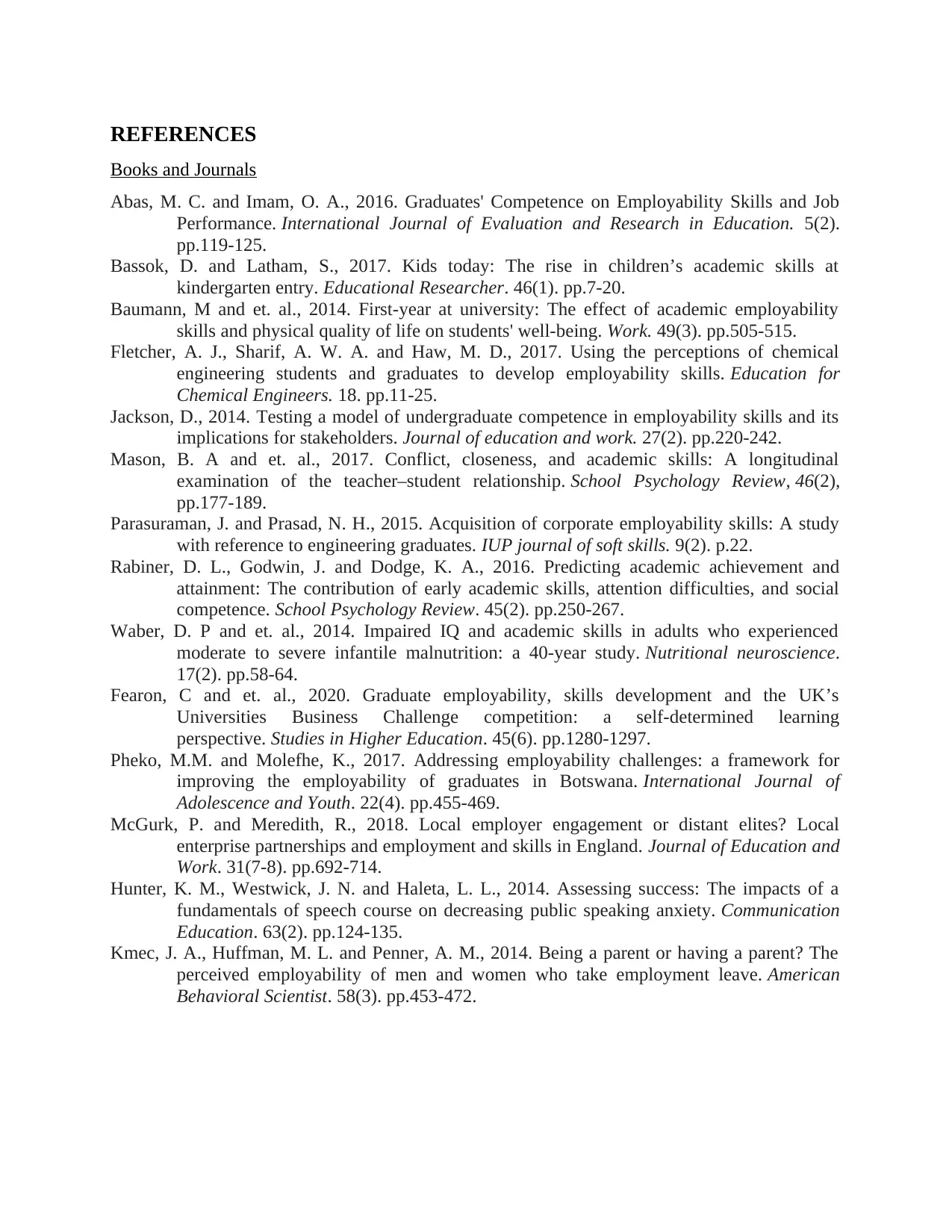
REFERENCES
Books and Journals
Abas, M. C. and Imam, O. A., 2016. Graduates' Competence on Employability Skills and Job
Performance. International Journal of Evaluation and Research in Education. 5(2).
pp.119-125.
Bassok, D. and Latham, S., 2017. Kids today: The rise in children’s academic skills at
kindergarten entry. Educational Researcher. 46(1). pp.7-20.
Baumann, M and et. al., 2014. First-year at university: The effect of academic employability
skills and physical quality of life on students' well-being. Work. 49(3). pp.505-515.
Fletcher, A. J., Sharif, A. W. A. and Haw, M. D., 2017. Using the perceptions of chemical
engineering students and graduates to develop employability skills. Education for
Chemical Engineers. 18. pp.11-25.
Jackson, D., 2014. Testing a model of undergraduate competence in employability skills and its
implications for stakeholders. Journal of education and work. 27(2). pp.220-242.
Mason, B. A and et. al., 2017. Conflict, closeness, and academic skills: A longitudinal
examination of the teacher–student relationship. School Psychology Review, 46(2),
pp.177-189.
Parasuraman, J. and Prasad, N. H., 2015. Acquisition of corporate employability skills: A study
with reference to engineering graduates. IUP journal of soft skills. 9(2). p.22.
Rabiner, D. L., Godwin, J. and Dodge, K. A., 2016. Predicting academic achievement and
attainment: The contribution of early academic skills, attention difficulties, and social
competence. School Psychology Review. 45(2). pp.250-267.
Waber, D. P and et. al., 2014. Impaired IQ and academic skills in adults who experienced
moderate to severe infantile malnutrition: a 40-year study. Nutritional neuroscience.
17(2). pp.58-64.
Fearon, C and et. al., 2020. Graduate employability, skills development and the UK’s
Universities Business Challenge competition: a self-determined learning
perspective. Studies in Higher Education. 45(6). pp.1280-1297.
Pheko, M.M. and Molefhe, K., 2017. Addressing employability challenges: a framework for
improving the employability of graduates in Botswana. International Journal of
Adolescence and Youth. 22(4). pp.455-469.
McGurk, P. and Meredith, R., 2018. Local employer engagement or distant elites? Local
enterprise partnerships and employment and skills in England. Journal of Education and
Work. 31(7-8). pp.692-714.
Hunter, K. M., Westwick, J. N. and Haleta, L. L., 2014. Assessing success: The impacts of a
fundamentals of speech course on decreasing public speaking anxiety. Communication
Education. 63(2). pp.124-135.
Kmec, J. A., Huffman, M. L. and Penner, A. M., 2014. Being a parent or having a parent? The
perceived employability of men and women who take employment leave. American
Behavioral Scientist. 58(3). pp.453-472.
Books and Journals
Abas, M. C. and Imam, O. A., 2016. Graduates' Competence on Employability Skills and Job
Performance. International Journal of Evaluation and Research in Education. 5(2).
pp.119-125.
Bassok, D. and Latham, S., 2017. Kids today: The rise in children’s academic skills at
kindergarten entry. Educational Researcher. 46(1). pp.7-20.
Baumann, M and et. al., 2014. First-year at university: The effect of academic employability
skills and physical quality of life on students' well-being. Work. 49(3). pp.505-515.
Fletcher, A. J., Sharif, A. W. A. and Haw, M. D., 2017. Using the perceptions of chemical
engineering students and graduates to develop employability skills. Education for
Chemical Engineers. 18. pp.11-25.
Jackson, D., 2014. Testing a model of undergraduate competence in employability skills and its
implications for stakeholders. Journal of education and work. 27(2). pp.220-242.
Mason, B. A and et. al., 2017. Conflict, closeness, and academic skills: A longitudinal
examination of the teacher–student relationship. School Psychology Review, 46(2),
pp.177-189.
Parasuraman, J. and Prasad, N. H., 2015. Acquisition of corporate employability skills: A study
with reference to engineering graduates. IUP journal of soft skills. 9(2). p.22.
Rabiner, D. L., Godwin, J. and Dodge, K. A., 2016. Predicting academic achievement and
attainment: The contribution of early academic skills, attention difficulties, and social
competence. School Psychology Review. 45(2). pp.250-267.
Waber, D. P and et. al., 2014. Impaired IQ and academic skills in adults who experienced
moderate to severe infantile malnutrition: a 40-year study. Nutritional neuroscience.
17(2). pp.58-64.
Fearon, C and et. al., 2020. Graduate employability, skills development and the UK’s
Universities Business Challenge competition: a self-determined learning
perspective. Studies in Higher Education. 45(6). pp.1280-1297.
Pheko, M.M. and Molefhe, K., 2017. Addressing employability challenges: a framework for
improving the employability of graduates in Botswana. International Journal of
Adolescence and Youth. 22(4). pp.455-469.
McGurk, P. and Meredith, R., 2018. Local employer engagement or distant elites? Local
enterprise partnerships and employment and skills in England. Journal of Education and
Work. 31(7-8). pp.692-714.
Hunter, K. M., Westwick, J. N. and Haleta, L. L., 2014. Assessing success: The impacts of a
fundamentals of speech course on decreasing public speaking anxiety. Communication
Education. 63(2). pp.124-135.
Kmec, J. A., Huffman, M. L. and Penner, A. M., 2014. Being a parent or having a parent? The
perceived employability of men and women who take employment leave. American
Behavioral Scientist. 58(3). pp.453-472.
1 out of 8
Related Documents
Your All-in-One AI-Powered Toolkit for Academic Success.
+13062052269
info@desklib.com
Available 24*7 on WhatsApp / Email
![[object Object]](/_next/static/media/star-bottom.7253800d.svg)
Unlock your academic potential
© 2024 | Zucol Services PVT LTD | All rights reserved.



